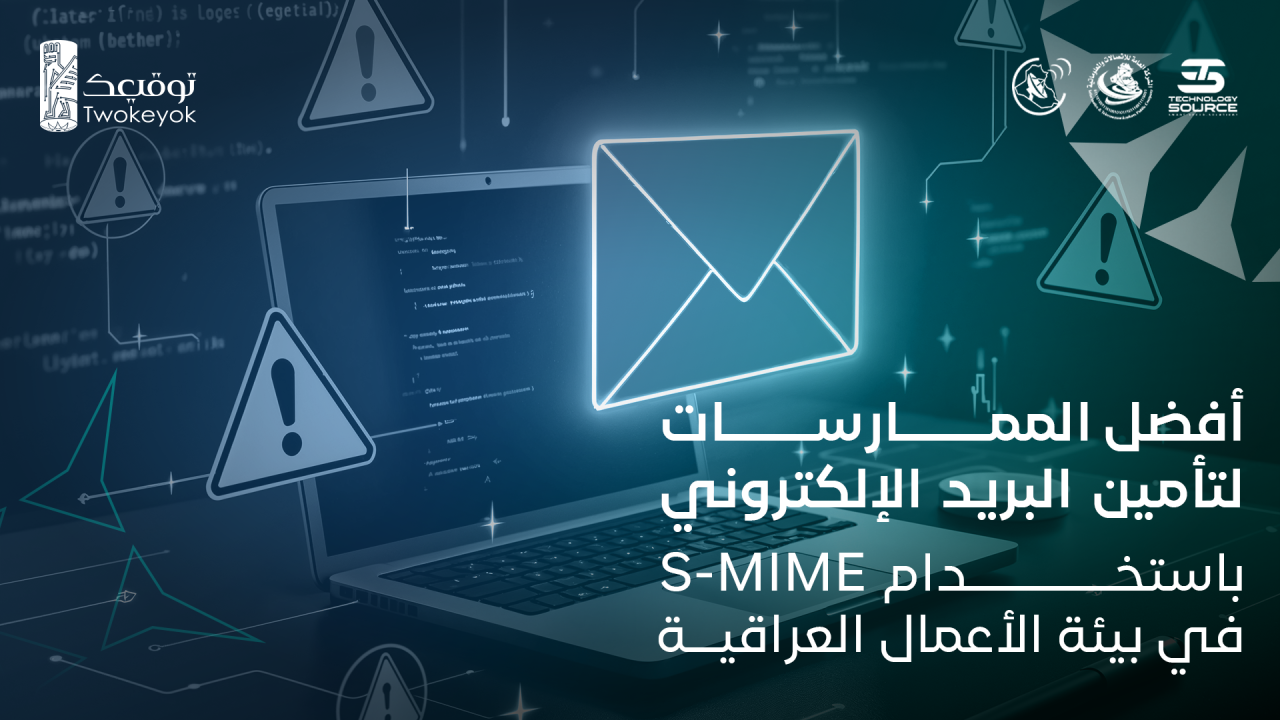
In today’s business world, email communication has become an integral part of daily operations for organizations, regardless of their size. As businesses increasingly rely on email to exchange sensitive information, the need for robust email security measures has never been more critical.
S/MIME (Secure/Multipurpose Internet Mail Extensions) is one of the most effective technologies for protecting business email communication, offering encryption and digital signatures to prevent data tampering and unauthorized access.
In Iraq’s rapidly evolving digital economy, securing business email is crucial for protecting sensitive corporate data. This article outlines the best practices for implementing S/MIME to enhance email security and data protection in Iraqi enterprises.
One of the most crucial steps in securing email communication is ensuring that employees are properly trained on digital security. Organizations should educate their workforce on:
✔ How to use digital signatures to verify the sender’s identity and ensure email authenticity.
✔ How to encrypt sensitive messages containing financial data, contracts, or confidential business information.
✔ How to validate digital certificates to confirm the legitimacy of senders before responding to emails.
Regular cybersecurity training helps reduce human errors and ensures that S/MIME encryption and digital signing are effectively utilized.
To fully utilize S/MIME, businesses must properly configure it within their corporate email infrastructure. Key steps include:
✅ Obtaining S/MIME digital certificates from a trusted Certificate Authority (CA)—either a nationally accredited Iraqi CA or a recognized international provider.
✅ Configuring S/MIME in corporate email clients like Microsoft Outlook, Thunderbird, or Apple Mail, which natively support S/MIME encryption and digital signatures.
✅ Enforcing encryption policies that mandate the encryption of sensitive emails and ensure all signed emails are digitally authenticated.
Proper email security configuration ensures that business-critical emails remain protected and cannot be intercepted or forged.
To enhance email security and compliance, organizations should establish clear security policies for email usage. Key recommendations include:
✔ Mandatory encryption for all emails containing financial data, customer information, or classified corporate details.
✔ Requiring digital signatures on all outbound corporate emails to verify sender authenticity and prevent impersonation attacks.
✔ Restricting the use of personal email accounts for business communications to minimize the risk of data leakage.
These corporate email security policies ensure consistent enforcement of S/MIME encryption and authentication across the organization.
Digital certificates are the foundation of S/MIME security. Organizations must ensure they use certificates issued by a reputable Certificate Authority (CA).
🔹 In Iraq, businesses can obtain government-certified digital certificates from the National Digital Certification Authority or from globally recognized trusted CA providers.
💡 Why use trusted certificates?
✔ Guarantees authentication, ensuring email senders and recipients are legitimate.
✔ Reduces the risk of phishing attacks, email spoofing, and identity fraud.
✔ Meets global compliance standards such as ISO security frameworks.
Using unlicensed or self-signed certificates can expose businesses to security vulnerabilities, making trusted certification a necessity.
Like any cybersecurity tool, S/MIME security needs regular updates to stay ahead of cyber threats. Organizations should:
✔ Regularly renew digital certificates to maintain encryption and authentication integrity.
✔ Conduct routine security audits to identify vulnerabilities in email encryption protocols.
✔ Ensure compliance with the latest cybersecurity regulations governing email security and data protection laws in Iraq.
By keeping security systems up to date, businesses can proactively defend against email-based cyberattacks.
S/MIME can be further strengthened by integrating it with enterprise security frameworks such as:
✅ Identity verification systems – ensuring only authorized employees can access sensitive email data.
✅ Role-based email access policies – restricting email encryption keys to authorized personnel only.
✅ Multi-factor authentication (MFA) – adding an extra security layer to prevent unauthorized email access.
Integrating S/MIME with broader enterprise security measures enhances organizational resilience against data breaches.
Iraqi businesses should ensure that their partners, vendors, and clients also adopt email security standards to maintain a fully protected email ecosystem.
Best practices include:
✔ Establishing agreements with business partners to use S/MIME encryption for all communications.
✔ Exchanging digital certificates with clients and stakeholders to validate signed emails.
✔ Ensuring all data exchanged via email is encrypted to protect it from cyber threats.
Implementing secure external email communication policies strengthens trust and regulatory compliance.
With Iraq undergoing rapid digital transformation, the need for secure email communication is more critical than ever. S/MIME provides a powerful solution for:
✔ Protecting sensitive business communications from cyber threats.
✔ Ensuring compliance with national and international data security regulations.
✔ Enhancing trust between businesses, government institutions, and customers.
By adopting S/MIME best practices, Iraqi organizations can safeguard their digital communications and prevent cybersecurity risks.
🚀 Want to enhance your email security? Start implementing S/MIME encryption and digital signatures today with TwoKeyOk and protect your corporate communications!